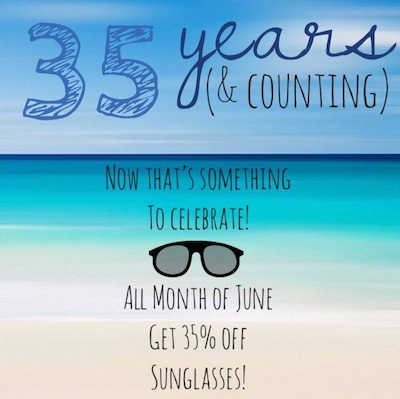 Most of us know what happens when we forget to use sunscreen in the sun - we get sunburned! And you've probably heard that you should also protect your eyes from the sun. But how is the sun harmful to your eyes, and what can you do to prevent damage to your vision?
Most of us know what happens when we forget to use sunscreen in the sun - we get sunburned! And you've probably heard that you should also protect your eyes from the sun. But how is the sun harmful to your eyes, and what can you do to prevent damage to your vision?
Ultraviolet (UV) light is electromagnetic radiation that is invisible to the human eye. Its name is derived from the spectrum of electromagnetic waves with frequencies higher than those that humans identify as the color violet. The sun emits ultraviolet radiation in the UVA, UVB, and UVC bands. The Earth's ozone layer blocks 97-99% of this UV radiation from penetrating through the atmosphere, and UVC rays rarely reach the Earth. UV rays are also emitted through other sources, such as welding machines, indoor tanning beds, and lasers.
UV light is absorbed by molecules which are present in the eye cells and tissues. If too much UV light is absorbed, eye structures such as the cornea, the lens and the retina can be damaged.
High intensities of UVB light are hazardous to the eyes. Exposure of insufficiently protected eyes to ultraviolet rays can cause Photokeratitis or ultraviolet keratitis, a painful condition of the eye. This is similar to a sunburn of the cornea and conjunctiva, and is not usually noticed until several hours after exposure. Photokeratitis may be painful and include symptoms such as red eyes, a foreign body sensation or gritty feeling in the eyes, extreme sensitivity to light and excessive tearing.
Long-term exposure to UV rays can lead to serious diseases of the eye, including damage to the retina, pterygium (a growth that invades the corner of the eyes) and pinguecula (a yellowish, slightly raised lesion that forms on the surface tissue of the white part of your eye.) The longer the eyes are exposed to solar radiation, the greater the risk of developing conditions such as cataracts or macular degeneration later in life.
Just as sunscreen keeps the sun's UV rays from harming your skin, UV protection for eyeglasses block those same rays from damaging your eyes.
Ordinary, untreated eyeglasses give some protection against UV light. Plastic lenses provide a better amount of UV coverage than glass. Some plastic lens materials, such as polycarbonate, inherently block most UV light, and photochromic lenses provide full UV protection. A UV coating can be applied to most eyeglass lenses without changing the appearance of the lenses, which will give better protection. But even a treatment that completely blocks UV light will not protect the eye from light that arrives around the lens. If you spend a lot of time outdoors in bright sunlight, wrap-around frames can provide additional protection from harmful solar radiation.
Some contact lenses have UV protection, but you should still wear sunglasses because UV rays may affect the eye tissue that is not covered by the contact lenses.
Of course, many people don't wear prescription glasses, and look to sunglasses to protect our eyes. In addition, those who do wear prescription eyeglasses may wish to choose sunglasses for different activities.
Bridgeport Family Vision Clinic has many styles to choose from and if you have always wanted to have a pair of prescription sunglasses now is your chance, we are here to help!